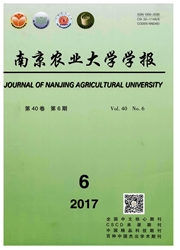

 中文摘要:
中文摘要:
The H19 gene, which is imprinted with preferential expression from the maternal allele, was one of the first identified imprinting genes in mammals. Recent studies revealed that correct imprinting of the H19 gene plays a vital role in human spermatogenesis. To investigate whether imprinting defects were associated with the hybrid sterility of male cattle-yak, the methylation patterns of the H19 imprinting control region (ICR) and H19 mRNA expression in the testes of cattle-yak, yak, and cattle were examined. The results showed that the 3rd CCCTC-binding factor (CTCF) site of the H19 ICR was significantly hypomethylated in the testes of cattle-yak compared with yak or cattle. As expected, H19 was expressed at a significantly higher level in cattle-yak than in yak or cattle. These results suggest that imprinting defects of the CTCF- binding site in the H19 ICR were possibly associated with disturbed spermatogenesis of male cattle-yak. Thus, we propose that disorders in H19 imprinting, resulting in an increased H19 mRNA expression, might contribute to the sterility of F1 male hybrids between cattle and yak.
 英文摘要:
英文摘要:
The H19 gene, which is imprinted with preferential expression from the maternal allele, was one of the first identified imprinting genes in mammals. Recent studies revealed that correct imprinting of the H19 gene plays a vital role in human spermatogenesis. To investigate whether imprinting defects were associated with the hybrid sterility of male cattle-yak, the methylation patterns of the H19 imprinting control region (ICR) and H19 mRNA expression in the testes of cattle-yak, yak, and cattle were examined. The results showed that the 3rd CCCTC-binding factor (CTCF) site of the H19 ICR was significantly hypomethylated in the testes of cattle-yak compared with yak or cattle. As expected, H19 was expressed at a significantly higher level in cattle-yak than in yak or cattle. These results suggest that imprinting defects of the CTCF- binding site in the HI9 ICR were possibly associated with disturbed spermatogenesis of male cattle-yak. Thus, we propose that disorders in H19 imprinting, resulting in an increased H19 mRNA expression, might contribute to the sterility of F1 male hybrids between cattle and yak.
 同期刊论文项目
同期刊论文项目
 同项目期刊论文
同项目期刊论文
 期刊信息
期刊信息
